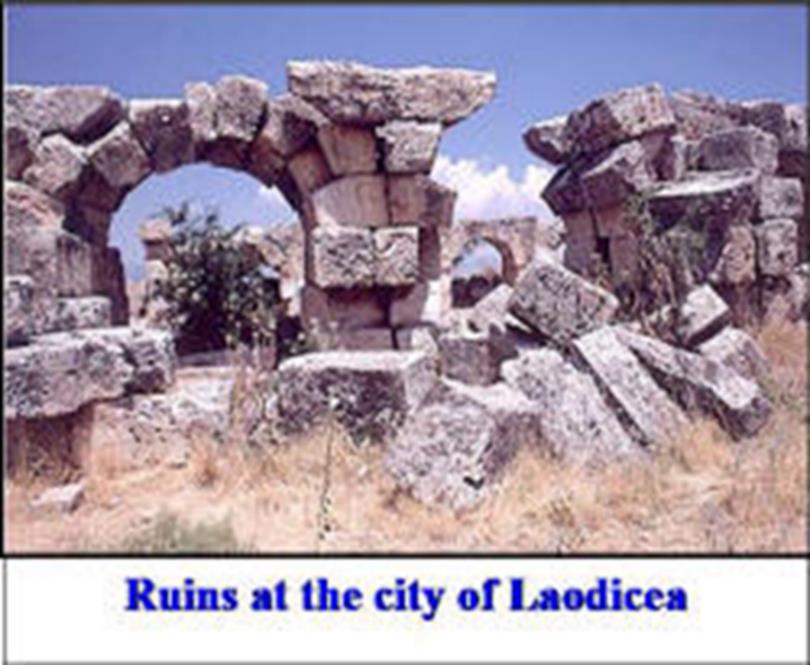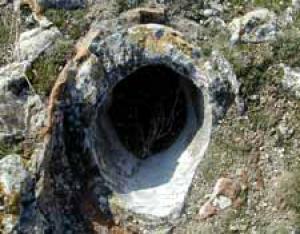Introduction
We continue the series with a look at the seventh of
the churches of Asia. This church is the church at
Laodicea. Let us consider this church.
Revelation 3:14-22
14 And unto the angel of the church of the
Laodiceans write; These things saith the Amen, the
faithful and true witness, the beginning of the
creation of God;
15 I know thy works, that thou art neither cold nor
hot: I would thou wert cold or hot.
16 So then because thou art lukewarm, and neither
cold nor hot, I will spue thee out of my mouth.
17 Because thou sayest, I am rich, and increased
with goods, and have need of nothing; and knowest
not that thou art wretched, and miserable, and poor,
and blind, and naked:
18 I counsel thee to buy of me gold tried in the fire,
that thou mayest be rich; and white raiment, that
~ 305 ~
Church History Through the Trail of Blood
thou mayest be clothed, and that the shame of thy
nakedness do not appear; and anoint thine eyes
with eyesalve, that thou mayest see.
19 As many as I love, I rebuke and chasten: be
zealous therefore, and repent.
20 Behold, I stand at the door, and knock: if any
man hear my voice, and open the door, I will come
in to him, and will sup with him, and he with me.
21 To him that overcometh will I grant to sit with
me in my throne, even as I also overcame, and am
set down with my Father in his throne.
22 He that hath an ear, let him hear what the Spirit
saith unto the churches.
(KJV)
The Laodicean Age 1900 - Present
The turn of the century saw great changes taking
place both in the world and in the church. Not only
were there new bibles, new religions, but the Church
began to compromise with paganism again. An
ecumenical spirit has invaded the church so that
many desire to reunite with Rome. Biblical standards
fall as worldliness also corrupts the minds of
believers.
Faith is undermined through Higher Criticism
coming from German Theologians, eventually
~ 306 ~

Church History Through the Trail of Blood
coming to the "God is Dead" teaching of the 1960's.
The word of God is replaced with a powerless gospel
in many churches, who now rely upon gimmicks
rather than the Living Word.
This age also sees the rise of the World Council of
Churches, Ecumenism, and Interfaith organizations.
The Laodicean age is one of spiritual lukewarmness
and Christless Christianity.
How fitting were the characteristics of this last age to
represent the age in which we now live. For example,
~ 307 ~
Church History Through the Trail of Blood
they worshipped one god, Zeus, who was the chief
and father of the gods. This forecast the twentieth
century 'one God, father-of-us-all' religious premise
that sets forth the brotherhood of man, and is even
now bringing together the Protestants, Catholics,
Jews, Hindus, etc. with the intent that a mutual form
of worship will increase our love, understanding, and
care of each other. The Catholics and Protestants are
even now striving for and gaining ground in this
union with the avowed intent that all others will
follow. This very attitude was seen in the United
Nations Organization when the world leaders refused
to recognize any one individual concept of spiritual
worship but recommended putting aside all those
separate concepts with the hopes that all religions
become leveled into one, for all desire the same
goals, all have the same purposes, and all are
basically right, so it is said.
Notice the name, Laodicea, 'the people's rights', or
'justice of the peoples.' Was there ever an age like the
twentieth century church age that has seen ALL
nations rising and demanding equality, socially and
financially? This is the age of the communists where
all men are supposedly equal, though it is only so in
theory. This is the age of political parties who call
themselves Christian Democrats, and Christian
Socialists, Christian Commonwealth Federation, etc.
According to our liberal theologians Jesus was a
socialist and the early church under the guidance of
the Spirit practiced socialism, and thus we ought to
do so today.
The City of Laodicea
~ 308 ~

Church History Through the Trail of Blood
The city used to be known as Diospolis (City of
Zeus) or Rhoas, but Antiochus II (250 B.C.) renamed
the city after his wife Laodice. The city is located
about 160 km (100 miles) east of Ephesus and 18 km
(11 miles) west of Colossae.
After the Romans became rulers of the city in 133
B.C., they reconstructed the roads and Laodicea
became the major junction of traffic west
to Ephesus and the Aegean, north and west to
Philadelphia, Pergamum, and Smyrna, and south to
the Mediterranean. The small city grew rapidly under
Roman rule and became very wealthy. This is
demonstrated by the fact an earthquake in A.D. 60
destroyed the city and the city refused imperial
financial aid to rebuild.
The chief export of the city was a seamless garment
made of glossy black wool.
~ 309 ~
Church History Through the Trail of Blood
The city was also known for its water system, the
aqueduct was built from large stones with a central
circular channel. The water was transported to the
city from mountain springs.
The city had a cosmopolitan population including
Roman colonizers, the original Phrygians, Jews, and
immigrant Syrian settlers. Antiochus the Great
transported 2,000 Jewish families to Phrygia from
Babylonia. The wealth of Jewish population is
demonstrated by Cicero who reported 20 pounds of
gold, as the annual contribution Jews to Jerusalem in
62 B.C. The city had a medical school to which was
connected the famous “Phrygian powder” a salve for
the eyes. This school was known worldwide.
Zeus and Isis worship were known in the city. The
city minted its own coins, the inscriptions of which
show evidence of the worship of Zeus, Æsculapius,
Apollo, and the emperors. In the Roman period, the city was famous for its bankers. Even the famous
Roman orator and statesman, Cicero, used their
services.
The site of the ancient city now lies in Turkey. Much
archaeological work has been done on the ancient
site. The previous picture is only one of many that
have been taken of the existing ruins of the city. The
latest work unearthed a statue of Roman Emperor
Trajan in 2019.
~ 310 ~
Church History Through the Trail of Blood
The Church at Laodicea
Jesus opening words to this church was to let them
know that He knew about their works. Thus, He was
able to say with all authority that the church was
lukewarm, neither cold nor hot. Cold means "without
active life," while hot indicates abounding, vital
energy, expressed in the church. The church at
Laodicea was neither. She had life, but it was in
hibernation, inactive, unproductive asleep, had
become almost totally barren. She had lost her zeal
(fervency) she once had while the frost of
indifference had fallen upon her.
Jesus went on to say that He wished they were either
hot or cold, not lukewarm, not merely in a daze,
meandering about, spiritually unstable, but holding a
positive defined position. Because they were
satisfied with carelessness, indifference, existing in a
nonproductive state, barren and unfruitful, without
spiritual life (the indwelling of the Holy Spirit), cold
or dead, nor hot, zealous on fire for God as they
should be, Jesus said He would spue them out of His
mouth. He said, “I am about to vomit you (as a
church) out of my mouth.” “I am about to revoke
your ambassadorship, your witnessing power or
dynamics, as a church of mine, withdraw my
commission or invalidate your administrative right
as a testator, because your indifference and
carelessness disgusts me,” the Lord warns.
~ 311 ~
Church History Through the Trail of Blood
The church made the claim in boastful and carnal
pride, with a self-satisfied air. She states, “I have
become and am rich, of my own strength or accord,
and I have or hold not a single need.” They forgot to
recognize that it was God who gave them "the power
to get wealth." They were so blinded to their spiritual
plight before God, they knew not as they should have
known. This congregation did know not know that
they were spiritually impotent, powerless, without
influence.
They were in a wretched state. They were as an
object to be pitied, needing pity, as a cripple, an
invalid.
There were impoverished in spiritual things and
spiritual power, like Jonah under the gourd outside
of the city of Nineveh.
They were blind, and naked, unclothed in a spiritual
sense, lacking spiritual comfort, food, and clothing.
Jesus says He counsels they to “Buy from me gold
that has already been refined out of the fire,” pure,
true gold. This was an ironical reminder of their
spiritual poverty. To buy from Him reminded them
of their trust in themselves, though they were lacking
character. They were to do this to be truly rich, not
having nor holding a need.
Jesus instructs them to buy from Him white raiment
that they might be clothed so that the shame of their
~ 312 ~
Church History Through the Trail of Blood
nakedness could not be seen. They were to anoint
their eyes with eye salve so that they might have
spiritual sight or discernment.
Jesus loved them and because He loved them, He
called them to repentance. This was the only church
of the seven that He did not have a commendation to
give them.
He presents the picture of a lover standing outside the
door wanting to enter, but the latchstring is on the
inside and the door can only be opened voluntarily
and responsively by someone on the inside.
He encourages them to be overcomers, even in a
sinful church or congregation, the beggar on earth,
yet in the Lord will live in royalty as a king in glory.
Jesus will give many blessings for those who will
repent and obey.
Conclusion
What Happened to the Church in Laodicea? Church
history records that the church in Laodicea remained
dynamic after most churches in Asia disappeared.
One of its bishops was martyred for his faith in AD
161, about seventy years after John wrote his
warning to the city in Revelation. In AD 363,
Laodicea was the location chosen for a significant
church council, however, it seems that this council
was not composed of scriptural churches but those
who would soon become the Catholics. So, it
~ 313 ~
Church History Through the Trail of Blood
appears that the church in Laodicea learned its lesson
and God continued to bless the Christian community
there for some time.
~ 314 ~
Church History Through the Trail of Blood
Church History Through the Trail of
Blood





